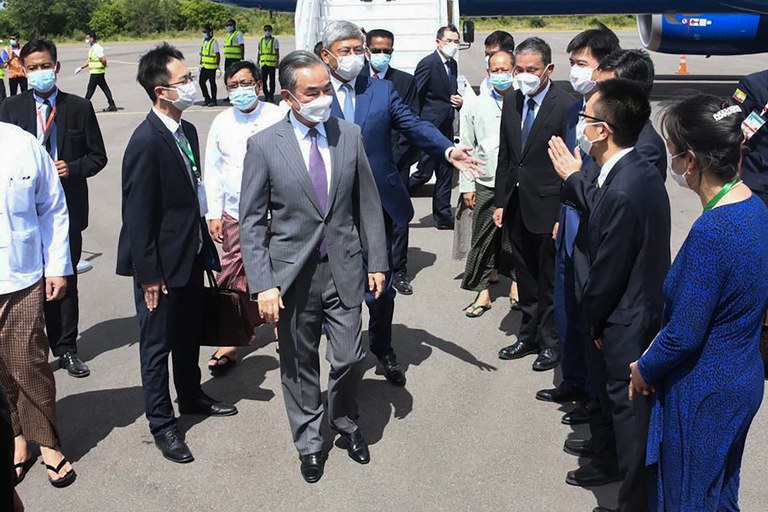A slew of recent visits by top Chinese officials to Myanmar appears to be part of a bid by Beijing to counter U.S. influence on the nation, but rebel leaders warned that propping up the junta is a miscalculation, as there will be no stability while it remains in power.
In the nearly 27 months since the military carried out a coup d’etat, China has been Myanmar’s staunchest ally.
While most Western nations shunned junta chief Senior Gen. Min Aung Hlaing in the aftermath of the takeover and a violent crackdown on his opponents, Beijing stood by the general in Naypyidaw. While foreign investment has fled the embattled nation, Chinese investors have flocked there. And despite international sanctions leveled at the regime, trade between the two neighbors continues unabated.
Support notwithstanding, Chinese officials have made multiple visits to Myanmar since the start of the year in what some analysts say is an influence peddling campaign by Beijing following U.S. President Joe Biden’s signing in late December of the National Defense Authorization Act, or NDAA, which will assist the country’s democratic forces.
“China has increased its dealings with the military junta,” a China affairs expert told Radio Free Asia, speaking on condition of anonymity citing security concerns. “It seems to me that China is worried about the United States’ NDAA and Burma Act. That’s why it has tried to maintain its influence by having more dealings with the military leaders.”
Among the provisions in the NDAA are programs designed to support those fighting the better-equipped military for democracy in Myanmar – including the country’s shadow National Unity Government, anti-junta People’s Defense Force paramilitary group, and various ethnic armies – with technology and non-lethal assistance.
Slate of high-profile visits
In the latest high profile visit, Peng Xiubin, the director of the International Liaison Department of the Communist Party of China, traveled to Naypyidaw on April 16 and secretly met with former junta leader Than Shwe, who ruled Myanmar from 1992 to 2011, and Thein Sein, the president of the country’s quasi-civilian government from 2011 to 2016.
Reports circulated that following Peng’s visit, Min Aung Hlaing met with the two former leaders to discuss the political situation in Myanmar.
Peng’s trip followed visits in February and March by Deng Xijun, China’s special envoy for Asian Affairs, who met with the junta chief on both occasions. Only two months earlier, the Chinese envoy convened a meeting with several ethnic armies from northern Myanmar across the border in southwestern China’s Yunnan province.

Thein Tun Oo, the executive director of the Thayninga Institute for Strategic Studies, which is made up of former military officers, described the uptick in meetings between the junta and Chinese officials as a bid by Beijing to “balance U.S. influence” in the region.
“The U.S is no longer the only country influencing the world,” he said. “Among such changes in world politics, Myanmar and China – which share a very long border – need to cooperate more closely. The bottom line is that China-Myanmar relations will continue to develop based on this.”
RFA emailed the Chinese Embassy in Yangon to inquire about the frequency of visits by top Chinese government officials to Naypyidaw in recent months and Beijing’s position on the political situation in Myanmar, but received no reply.
At the Chinese government’s regular press briefing held in Beijing on March 17, Chinese Foreign Ministry spokesman Wang Wenbin called Myanmar a “good neighbor,” adding that Beijing is closely following the situation there and hopes for a resolution through dialogue and consultation among all stakeholders.
Interests tied to peace
Chinese affairs expert Hla Kyaw Zaw told RFA that China will only be able to realize its interests in Myanmar if the country is at peace.
“China can only continue its investments and projects … if Myanmar is at peace,” he said. “The reason why China wants Myanmar to be peaceful is for its own economic interests.”
Among the China-backed megaprojects in Myanmar are the New Yangon City urban planning project, the Mee Lin Gyaing Energy Project in Ayeyarwady region, the Letpadaung Copper Mine in Sagaing region, and the Kyauk Phyu deep sea port and special economic zone in Rakhine state.
According to ISP-Myanmar, an independent research group, there are 35 China-Myanmar economic corridor projects underway in Myanmar that include railways, roads, special economic zones, sea ports and urban planning projects.
Than Soe Naing, a political analyst, agreed that Beijing’s relations with the junta hinge on the furtherance of its strategic interests.
“I see China cooperating with the military junta only to continue to maintain, implement and expand its economic interests in Myanmar, such as the strategic Kyauk Phyu deep sea port project, which is a bid by Beijing to obtain access to the Indian Ocean,” he said.

Than Soe Naing noted that China is trying to “divide the [ethnic armies] in northern Myanmar from the anti-junta resistance groups … under the pretext of peacemaking.”
But he said that China is actually working to exploit Myanmar’s internal conflict by attempting to “hold all the keys to the situation.”
No stability with junta
Kyaw Zaw, spokesman for the National Unity Government’s presidential office, warned China that there will only be stability in Myanmar if the forces of democracy succeed in their fight against the junta. He said only with stability in Myanmar will China realize its economic goals in the country.
“As long as there is a junta, Myanmar will not be at peace,” he said. “The junta will only terrorize the country with more violence and continue to torture the people. That’s why the country will remain destabilized under [the junta].”
A lack of stability in Myanmar will also impact the development, security, and economy of its neighbors, Kyaw Zaw added.
According to ISP-Myanmar, the value of foreign investment in Myanmar totaled more than U.S. $4 billion from February 2021 to April 2022, more than two-thirds of which was Chinese.
Translated by Myo Min Aung. Edited by Joshua Lipes and Malcolm Foster.



